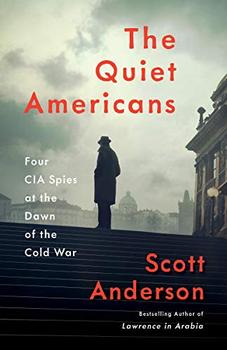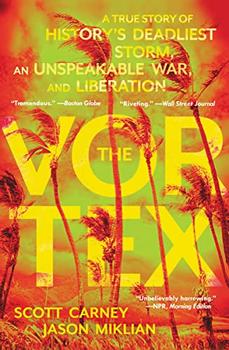Summary | Excerpt | Reviews | Beyond the book | Read-Alikes | Genres & Themes | Author Bio

Four CIA Spies at the Dawn of the Cold War--A Tragedy in Three Acts
by Scott AndersonFrom the bestselling author of Lawrence in Arabia, a gripping history of the early years of the Cold War, the CIA's covert battles against communism, and the tragic consequences which still affect America and the world today.
At the end of World War II, the United States dominated the world militarily, economically, and in moral standing - seen as the victor over tyranny and a champion of freedom. But it was clear - to some - that the Soviet Union was already executing a plan to expand and foment revolution around the world. The American government's strategy in response relied on the secret efforts of a newly-formed CIA.
The Quiet Americans chronicles the exploits of four spies - Michael Burke, a charming former football star fallen on hard times, Frank Wisner, the scion of a wealthy Southern family, Peter Sichel, a sophisticated German Jew who escaped the Nazis, and Edward Lansdale, a brilliant ad executive. The four ran covert operations across the globe, trying to outwit the ruthless KGB in Berlin, parachuting commandos into Eastern Europe, plotting coups, and directing wars against Communist insurgents in Asia.
But time and again their efforts went awry, thwarted by a combination of stupidity and ideological rigidity at the highest levels of the government - and more profoundly, the decision to abandon American ideals. By the mid-1950s, the Soviet Union had a stranglehold on Eastern Europe, the U.S. had begun its disastrous intervention in Vietnam, and America, the beacon of democracy, was overthrowing democratically-elected governments and earning the hatred of much of the world. All of this culminated in an act of betrayal and cowardice that would lock the Cold War into place for decades to come.
Anderson brings to the telling of this story all the narrative brio, deep research, skeptical eye, and lively prose that made Lawrence in Arabia a major international bestseller. The intertwined lives of these men began in a common purpose of defending freedom, but the ravages of the Cold War led them to different fates. Two would quit the CIA in despair, stricken by the moral compromises they had to make; one became the archetype of the duplicitous and destructive American spy; and one would be so heartbroken he would take his own life.
The Quiet Americans is the story of these four men. It is also the story of how the United States, at the very pinnacle of its power, managed to permanently damage its moral standing in the world.
Anderson's overriding argument is that America tarnished its reputation as a defender of freedom in the 1950s. By supporting totalitarian movements and covertly undermining or overthrowing democratically elected foreign governments that might prove troublesome down the road, America abdicated its moral leadership. What makes his case most persuasive are the experiences of the four CIA spies who lived on the front lines and saw the results on the ground. The author draws from their written and verbal accounts, which are detailed, damning and tragic in the sense of what could have been. The Quiet Americans is a riveting testament to those early Cold War warriors who put their lives on the line for a mission that eventually lost its meaning in the frenetic overreach of American foreign affairs...continued
Full Review
 (775 words)
(775 words)
(Reviewed by Peggy Kurkowski).
 The Quite Americans by Scott Anderson takes its name and inspiration from a highly popular 1955 spy novel by Graham Greene called The Quiet American.
The Quite Americans by Scott Anderson takes its name and inspiration from a highly popular 1955 spy novel by Graham Greene called The Quiet American.
Henry Graham Greene (1904-1991) was an English novelist, short story writer, journalist and playwright whose writing often focused on moral ambiguities set within political contexts. Many of his novels were very popular, especially his thrillers, or as he liked to call them, "entertainments."
Greene enjoyed writing "entertainments" dealing with spycraft and international espionage and was first inspired to write The Quiet American in 1951 after a jeep ride back to Saigon with a young American economic aid official. The young man regaled Greene with a lecture on how the Vietnamese needed...

If you liked The Quiet Americans, try these:

by Scott Carney , Jason Miklian
Published 2023
The deadliest storm in modern history ripped Pakistan in two and led the world to the brink of nuclear war when American and Soviet forces converged in the Bay of Bengal.

by Ben Macintyre
Published 2021
The "master storyteller" (San Francisco Chronicle) behind the New York Times bestseller The Spy and the Traitor uncovers the true story behind the Cold War's most intrepid female spy.